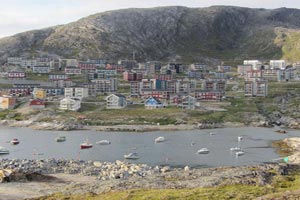relations and that the dispute between Canada and Denmark over the Arctic island of Hans is being fanned by third parties underscores how every player with a stake in the region will do everything to keep the focus alive not only on conflicting claims to parts of the Arctic with an eye on its oil, gas and mineral resources but also on its strategic, military and political potential.
Last year, a Chinese ship set sail from the Norwegian coast. Instead of taking a normal circuitous route, it cruised past the Arctic Ocean on a new course via North Pole to connect its mainland with Europe. Though the attempt failed in absence of heavy- duty ice-cutters, it marked the beginning of a new global game.
Earlier, a Denmark-owned Nordic Barents ship had succeeded in passing through the North Pole in 2010 along the Siberian coast to connect Norway with China. The passage is 30 per cent shorter than the usual shipping lanes via the Suez Canal and the piracy-prone Malacca Straits and the Gulf of Aden. The Chinese are eyeing to connect their far east with the coast of Canada and even Alaska. “It appears another area, where Chinese will overtake India to put the stamp of their economic and diplomatic supremacy,” an expert in Copenhagen, wishing anonymity, said.
The newly appointed Danish Ambassador for the Arctic, Klavs A Holm, admits the region has gained increased political and economic importance, thanks to oil extraction potential, minerals, and increased maritime traffic. He, however, cautions that although there are developmental opportunities, there are also great risks for people and the environment.
But the author Martin Breum says the economic significance of the region has been blown out of proportion. “Yes, there are fossil fuel reserves but extraction is uneconomical for any business venture,” he says. But he agrees that war was more to control Arctic routes and the countries were jostling to show their authority on the North Pole. “China exhibited its fast-growing interest by exploring a route to Europe via North Pole,” he says.
India, he adds, has not yet even shown the interest to join the international Arctic Council, though it has observer status at its technical council. Even though India has hired a remote northern most Norwegian island, Spitsberpergen, for scientific experiments, its frosty relations with Denmark have further squeezed India’s diplomatic clout in the region. India has downgraded its diplomatic contacts with
Copenhagen following a court refusal to extradite Kim Davy, a key accused in the Puralia arms drop case. India believes the authorities in Copenhagen did not exhaust all their executive responsibilities either to punish or to extradite Davy to India.
To add to the fury was the official Denmark Broadcasting Corporation airing a reality TV show from an Indian slum. Since then, its journalists have been barred to visit India.
Further, over past few years the local government in Greenland is increasingly asserting itself, looking to foreign countries for investment in extracting minerals. With the discovery of mineral wealth last week, it sent one of its senior ministers to visit Beijing to negotiate an agreement with the government officials and Chinese Bank. Though the officials in Copenhagen dismiss apprehensions of Greenland now charting its own diplomatic course, they privately admit a new situation was emerging with China directly goading the island.
Internationally acclaimed expert on Arctic issues, Breum, who has authored a book ‘When the ice disappears – Denmark as a major Arctic power, the oil in Greenland and the fight over the North Pole’, believes that controlling waterways makes countries influential and powerful. But he maintains that making Arctic a navigable waterway requires huge investments and international cooperation on setting up search and rescue facilities and also mechanism to prevent oil spills.
With Denmark and Russia having strong territorial claims on the North Pole, and the US instigating Greenland to become an independent state, suggestions are coming to make the Arctic region a zone of international heritage and disengagement. Breum further says, “While it was an easy solution for the South Pole, which was uninhabited, while the rims of Arctic Oceans are habited by indigenous tribes and according to UN laws of seas, the extended economic zones of Russia, Canada and Denmark overlap at the North Pole.”
Another challenge is the idea of setting up a “mini-NATO” in the Arctic region, which was a subject discussed at a summit of Northern European countries in London in 2011. The name refers to a proposed military bloc of Scandinavian countries, ex-Soviet Baltic republic and the United Kingdom, which many describe as the ‘response to Russian claims on the North Pole.’















